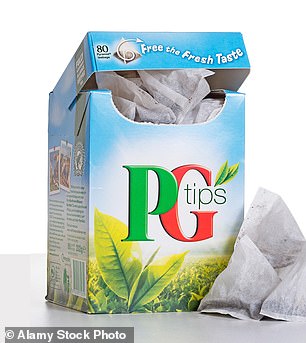
Pioneer: Back in the 1990s, Mpac helped PG Tips owner Unilever to make the first pyramid teabags
Insulin-monitoring patches are a boon for diabetics, allowing them to check their blood sugar regularly and alerting them if readings are too high or too low. The technology behind these devices is complex and accuracy is critical – false readings or poor performance can be life-threatening.
North Yorkshire-based Mpac makes the kit that ensures every patch goes into the right box with the right instructions for each user.
The company is listed on AIM and valued at little more than £70 million but it is known as an industrial pioneer. Back in the 1990s, Mpac helped PG Tips owner Unilever to make the first pyramid teabags, considered a defining moment for designers and tea lovers alike.
Today, Mpac customers include multinational firms from drug giants GSK and AstraZeneca to food and drink producers Nestle, Mars and Diageo. Mpac specialises in the design, production and maintenance of automated packaging systems.
Some are relatively simple – putting Mars ice-cream bars into boxes at a rate of 12 per second. Some are more complicated – packaging contact lenses or diabetic patches. Whatever the end-use, however, Mpac has built a reputation for reliability, technical prowess and after-care, working closely with customers to create and build exactly what they need.
The business has had its challenges. During 2022, as supply chains were turned upside-down by a lack of semi-conductor chips, Mpac was forced to delay orders and profits plunged.
Last year was much improved, however, with the company on course to reveal a 10 per cent increase in sales to £107 million and a doubling in pre-tax profits to £7 million, when results are announced in March.
Midas recommended Mpac in 2019, when the shares were £2.03. They shot up to £6 in 2021 before last year’s wobble sent them tumbling down to below £2. Now they are back on the rise at £3.38.
Chief executive Adam Holland took the reins last spring and is determined to increase annual sales by at least 10 per cent over the next several years, creating a business with turnover of £200 million and driving up profit margins. The target is ambitious but Mpac started this year with a record order book, including contracts from new and existing customers.
Having focused on healthcare, food and drink, the firm is moving into a new category, working with companies such as US-listed Freyr, to package innovative lithium batteries, that are greener and simpler to make than conventional ones. A prototype factory is testing the product in northern Norway and a new site is expected to follow in the American state of Georgia.
The automated packaging market is huge, with global sales of around £40 billion, so Mpac is a small fish in a very large pond. Holland sees this as an opportunity. Mpac’s engineers are renowned the world over, customers are appreciative and revenues are moving in the right direction.
Midas verdict: At £3.38, Mpac shares have risen more than 66 per cent since Midas recommended them, but they are still cheaper than many peers and should increase considerably in price from here. Existing shareholders would do well to keep their stock. New investors might bag a few at current levels.
Traded on: AIM Ticker: MPAC Contact: mpac-group.com or 024 7642 1100



